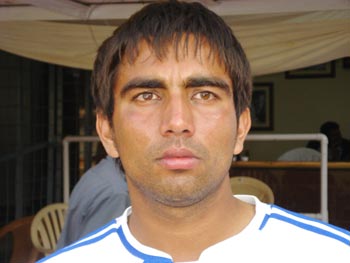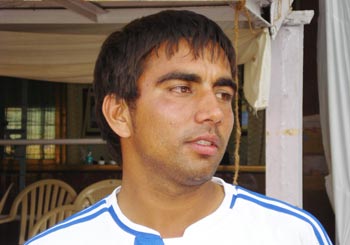He has taken 86 wickets in the last three Ranji Trophy seasons, and in just three matches -- the third in progress -- this year, he already leads the standings with a total of 15 scalps to his credit.
On Tuesday, Vikramjeet Singh Malik ensured his side got the early advantage over heavyweights Mumbai with a six-wicket haul.
 Malik's six for 33 enabled Himachal Pradesh skittle out the defending champions for just 162 in their first innings, and on their home turf.
Malik's six for 33 enabled Himachal Pradesh skittle out the defending champions for just 162 in their first innings, and on their home turf.
The visitors were 100 for three at close of play on Day 1.
Ask the 26-year-old bowler if this was his best performance till date and he is quick to nod his head in disagreement.
"My best performance was seven for 43 against Haryana at Rohtak last year. In that match I had 13 wickets," he recollects with pride.
The fact that it was a Plate Division match doesn't bother Malik much. Prod him further about his best effort in the Super League thus far and the bowler has a different answer again.
"Against the bigger teams, my best effort will be the six for 25 against Delhi at Dharamsala two years back," he says, before adding, "The Delhi team then had almost everyone playing -- Virender Sehwag, Gautam Gambhir, Aakash Chopra -- and we still managed to get them out for only 74 all out in the first innings."
So how does Malik rate this spell?
"In the first spell [three for eight in eight overs] it was easier because there was a hint of movement in the wicket," he analyses. "The third spell was tough as there was nothing in the wicket and also no movement in the air. The only thing I could rely on was accuracy."
And which was the wicket he liked the most?
"Wasim Jaffer."
On this occasion the response is followed by a flashback.
"He also happened to be my first wicket in first class cricket; on that occasion too I had got him leg before, at the Wankhede."
Facing bigger opposition seems to bring the best out of Malik.
"There is no strategy," he explains, adding, "But the theory is simple. If you put the ball in the right areas, the batsman, whosoever he is, will get out in any case."
Again the response in this case is followed by a somewhat elaborate explanation.
"When you are playing stronger opposition like Delhi or Mumbai, you enjoying bowling because you know that they will play the ball, even if according to the merit," explains Malik. "And when the batsman is playing the ball, the bowler also has a chance of getting a wicket.
"However, the batsmen of smaller teams don't take risks and will only hit a ball that is meant to be hit."
 A haul of 26 wickets in seven matches by Malik helped Himachal win the Plate Division in 2006-07. The following season, in the Elite Division, Malik impressed again with 27 wickets in seven games.
A haul of 26 wickets in seven matches by Malik helped Himachal win the Plate Division in 2006-07. The following season, in the Elite Division, Malik impressed again with 27 wickets in seven games.
However, it wasn't enough for Himachal to avoid relegation. But last year, Malik was at his best again, snaring 33 scalps in just six games and his team was back in the Super League.
And the start to this campaign has been spectacular, to say the least. Does it bother him that playing for a minnow like Himachal Pradesh hampers his chances of getting noticed by the selectors?
"Whether you play in Super League or Plate Division doesn't matter," he says, nodding his head in disagreement to the question. "Even Sreesanth doesn't play in the Elite Division. Still he has done well and made his way back into the national team.
The level you are playing doesn't matter. Your performance does. Whoever is consistent and considered a good prospect by the selectors will end up playing in the national team."
So, why hasn't he been able to make it into the national team so far?
"I haven't been able to perform as well as expected," admits Malik. "For example, I had got such a good opportunity in the Challenger Trophy [as a replacement for Irfan Pathan] and I ended up bowling a lot of no balls. Had I managed to bowl well there, I would have been in the limelight and would have probably made a breakthrough.
"But it was not the case. I need to do better," he adds.
Having performed so consistently in the last few seasons there must have been moments when he felt cheated by the selectors?
"I felt like that in the first two years of my career. In under-19, I had the highest wickets in the national level but I never got a chance," he says. "The first couple of years at the senior level also I bowled well but nothing happened.
"Now, I think, the only thing I can do is bowl well and let me concentrate on doing that. It is not in my hands to get selected. In any case, some players are fortunate to get a chance early in their career. Some get it late."
But playing for a bigger team would have certainly helped?
"Had I played for a bigger team like Mumbai, maybe I would get a chance early," he admits, before adding, "However, even then it would have been up to me to make the most of the opportunity."
So what is it that enables him to pick wickets on a regular basis?
"My policy is simple: bowl consistently. If you have the quality you can claim wickets on any surface," he explains.
"All you need to have is the right attitude."
Photographs: Bikash Mohapatra






